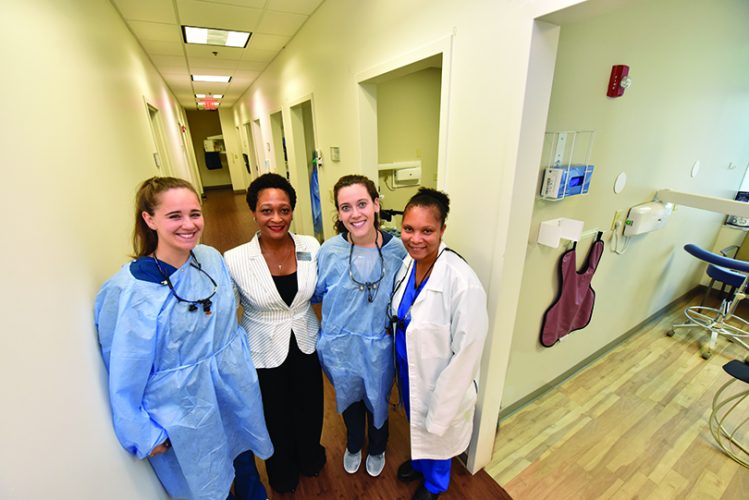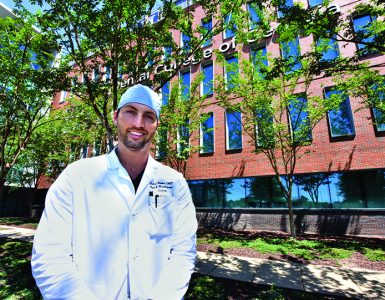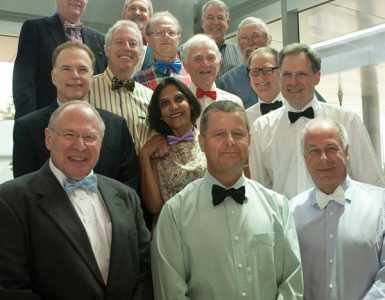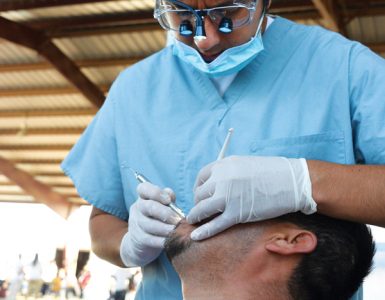Meet Ketarya Hunt, matchmaker.
That’s not her official title, but she excels in the role nonetheless.
As DCG’s community liaison for externship teaching sites, Hunt matches students with community-based partnerships that offer an early glimpse of some of the most underserved populations in Georgia.
“I meet with students during junior orientation and ask one thing of them: to be open-minded,” says Hunt, whose actual title is DCG director of community outreach programs. During orientation sessions, she invites students to sign on for clinical rotations in their senior year for public health clinics, private practices and Federally Qualified Health Centers that largely serve socioeconomically challenged citizens.
“This is a wonderful opportunity for students to provide oral health education and dental service to Georgia citizens who need dental care that is not readily available in urban, rural and underserved communities,” says Hunt. “I look for good matches between the students and the dentists so they can all have a rewarding experience.”
Hunt joined DCG in 2007 to oversee the initiative, funded by the Robert Wood Johnson Foundation from 2008-10 and by the Health Resources and Services Administration (HRSA) continuously since 2006. “We reapply for the funding every three years and are currently funded through 2022 for an award of approximately $2 million,” says Hunt, whose duties include conducting clinical site visits and maintaining the extramural schedule for the 90-plus seniors who participate. She also implements community-focused programs for dental seniors and residents and for nine years managed a loan-repayment program for private dental practitioners to increase access to oral health care in underserved areas statewide.
The funding makes the externships possible, but it is Hunt — and the participating students and dentists — who have made it a glowing success, says Dean Carol A. Lefebvre. “The program has grown significantly since its onset, which is a testament to the hard work and incredible commitment on the part of everyone involved,” Lefebvre says.
Indeed, when Hunt first came on board, six clinics had signed on to participate, agreeing to open their doors to students for two-week clerkships. The number today stands at 27 — and growing.
“We’ve seen a snowball effect, a gradual increase of acceptance from students, faculty and community members that has enabled us to make a major impact throughout Georgia,” Hunt says.
The timespan has grown as well, with participating seniors now committing to four two-week clerkships, for a total of eight weeks.
It hasn’t always been an easy sell. Many students prefer the convenience of completing their clinical training solely on campus, refining their skills alongside faculty in the DCG building’s gleaming state-of-the-art clinics. But that’s where Hunt’s matchmaking skills — and her considerable powers of persuasion — come into play.
“Early on, I talked with students about the value of the opportunity to connect to the community by going off campus for part of their clinical training,” says Hunt, a certified health education specialist who earned a bachelor’s degree in biology with a minor in chemistry from Savannah State University and a master of public health degree from Armstrong Atlantic State University. “We had to get everyone used to the idea.”
Hunt has worked tirelessly to grease the wheels. She also works hard to accommodate students by matching them to clinics in their hometowns or nearby communities when possible. “The students like the idea of going back home,” Hunt says. “I try to find underserved communities where we believe students may return post-graduation. We expose them to dental health professional shortage areas that they may not have considered before graduation. Our ultimate goal is to increase the oral workforce in underserved areas long term.”
She can’t speak highly enough about the professionals who mentor them.
“Community-based dentists voluntarily open their doors to our students, then take the time to teach them and oversee their work,” Hunt says. “They also share their stories about how they chose to practice in public health clinics or underserved communities. This initiative wouldn’t be possible without their generous commitment to our program.”
The dentists insist the pleasure is all theirs.
“We all need help when we’re learning, and the students help me as much as I help them,” says Dr. Edmond Michael Franklin, who with his father, Dr. Edmond Franklin (’78) hosts student rotations at their three Vivid Smile Dental Centers.
Says his father, “I think they enjoy coming down here [to my practice in Waynesboro, Georgia]. Some of them have even rotated through here twice. I don’t like working under pressure, and I don’t create pressure for others. We go out of our way to be patient and understanding. I’ve been through the maze of dental school, and I know what they’re going through. Our aim is to help.”
Dr. Michael Frazier (’08) completed an off-campus rotation at the Northwest Health District Clinic’s Floyd County Health Department in Rome, Georgia his senior year, then after graduation opened a practice in Rochelle, Georgia. His practice follows the lead of the nonprofit clinic by offering extensive care to the uninsured and opening the office to DCG students for externships.
“That’s the full circle we’re aiming for,” says Hunt.
The depth of the students’ experiences is persuasive as well, she says.
“I work with students one-on-one, so we spend a lot of time together,” says Dr. Karyl Patten, dental director of Whitefoord Inc., established in 1995 to serve some of Atlanta’s neediest citizens. “I think the rotation gives them an opportunity to see health care in a public health light. They see people of modest means who often have extensive dental needs. It’s a different culture for them.”
The fast pace, she says, makes the time fly. “They hit the ground running and stay busy. They’ll say, ‘I didn’t know I could see so many patients in one day’ — but they seem to really enjoy it.”
Says Dr. Glenn Crooks, head dentist at the North Georgia Health District’s Whitfield County Health Department, “I love being able to share practical methods and new innovations — everything from the best materials to ensure a proper bite to the optimal carbide burs to shape and restore teeth.”
“I learned quite a lot from Dr. Crooks,” says Dr. Mason Sawyer (’18), who rotated through the clinic in 2017. “He definitely takes the time to watch and give you feedback. It was a very worthwhile experience.”
Hunt notes, “The students who rotate through these clinics come back to campus more confident.”
Clifton Bush, chief operating officer of the Albany Area Primary Health Care Clinic’s dental services in southwest Georgia, agrees that the scope of procedures in a public health clinic can vastly surpass the students’ expectations. “Many of our patients can’t afford specialists,” he says, “so we try to keep everything in-house. The students get a wide variety of experience in different procedures, including root canals, crowns and surgical extractions in addition to basic dentistry.”
Bush stresses that the teaching goes both ways. “The dentists have years of experience, which makes them great mentors,” he says, “and since the students are in the midst of their education, they share vital information as well.”
Indeed, Hunt stresses, it’s hard to find a more mutually beneficial program than this one. “The students enjoy working in real-world environments, and they offer real value to these communities — communities they ideally will return to after they graduate,” she says. “And the dentists tell me how great the students are, how enthusiastic they are to be there. They love that the students are open to the experience and open to engaging with populations they might not encounter on campus.”
Says Patten, “They get involved with the patients as much as I do. They see that their services are needed. I love it when they come. I like their outlook; I like their energy. They’re extremely well-trained students.”
That, Hunt says, is music to her ears.
“It’s very rewarding when I hear a student who was initially so hesitant about the program say, ‘This was the best thing that ever happened to me. I learned so much. I learned a lot about the community. Now I want to work there.’ That is the reward — choosing community-based dentistry when they originally maybe never have even considered it.”










